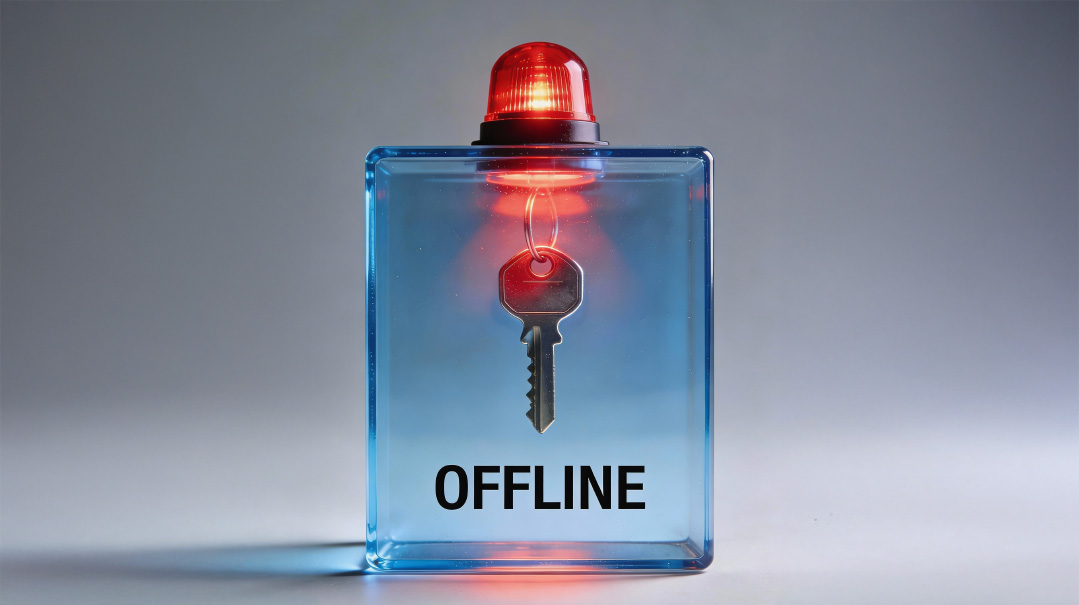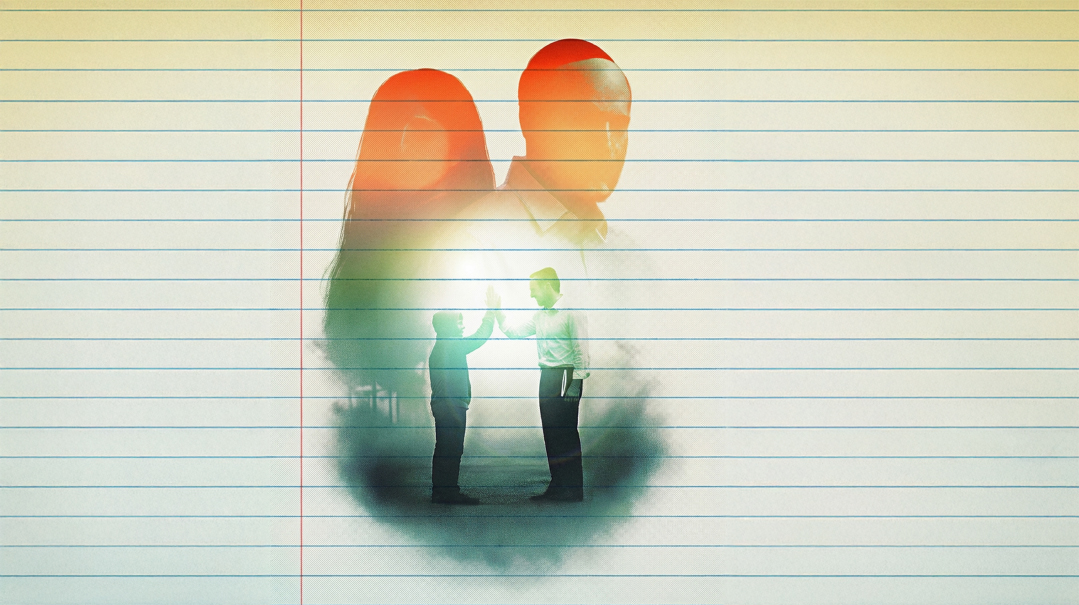That’s the Spirit
| December 11, 2019I’d noticed the empty seats. It wasn’t the first time this group was in trouble. But suspended?

Rabbi Moses: Don’t you realize that if your son weren’t with me in my home, he’d likely be on the streets?
Mr. Friedman: If you encourage alcohol and levity in your own home, how do you expect our boys to ever learn self-control?
Rabbi Moses
I
used to teach in a different yeshivah.
I’m not the type who brands my bochurim by letters of the alef-beis, as if they were esrogim. Let’s just say that at my old job, my biggest worry was having my entire shiur torpedoed by one brilliant question.
Then I switched to a different planet. A planet where everything’s a struggle.
Preparing is difficult. I want to engage everyone — the brighter ones, the less so, the non-academic, the ones who jiggle their legs and can’t seem to look at a page for more than 15 seconds at a time. Shiur is difficult — any interruption, even for another student’s question, can leave some of the stragglers floundering, unable to follow the train of thought. And then there are the difficulties that take place out of the classroom.
“Reb Hillel? Do you have a few minutes?” Rabbi Roseman, the menahel, intercepted me one Friday morning. His eyes were tired, and I noticed white hairs in his beard. We walked briskly to the office; apparently, this conversation was sensitive.
“It’s about some of your boys.” Rabbi Roseman sat down heavily. “The ones who are missing today. Berger, Spiegel, the whole chevreh... they’ve been suspended.”
I’d noticed the empty seats. It wasn’t the first time this group was in trouble. But suspended?
“We caught them cutting class, they weren’t up to any good, to put it mildly,” the menahel continued quickly, like he could tell I was about to argue. “And there’ve been reports about hanging out on Friday night, Motzaei Shabbos... They’re a bad influence on the class.”
I cut him off. “And suspending them — how will that help them? You think it’ll be a deterrent, giving them half a week to make even more trouble together?”
Rabbi Roseman raised his hands, palms upward, and shrugged. My boys would’ve called it the classic emoji-shrug. “It’s the rest of the class we’re looking at now. We need to make sure it doesn’t happen again.”
I shook my head vehemently. “But this is not a solution to the ‘hanging out’ problem. It’ll just make it worse. Suspend these boys as a group and the whole chevreh will become even tighter.” I cleared my throat. “With all due respect, Rabbi Roseman, we need to give them alternatives if we want to stop their behavior, not push them against the wall.”
It wasn’t the first time I’d argued with the school policy, but I’d never phrased it so strongly. The menahel gave me a sharp look, squinted a little through his glasses, and then sighed. “Reb Hillel, if you think you have the solution — I give you full permission to do it.”
The next week, I made a casual announcement to my class. “Guys, we’ve changed the clocks, Friday nights are really long. You’re all invited to come chill in my house, my wife makes a great cholent.”
I left quickly, not wanting to hear their reactions, not wanting to appear too needy. My worries were unfounded, though. On Friday night, just when I was joking to my wife that we might have to eat the entire commercial-sized pot of cholent by ourselves, there was a knock on the door. A solid group had turned up — not the entire class, but a good portion of it.
“Good Shabbos, good Shabbos,” I greeted them, hoping I sounded relaxed, not relieved. “Come on in, make yourselves comfortable.”
The boys gathered a little self-consciously at one end of the table. I joked around a little, appointed Yoni to be the cholent gabbai, and popped open a few beers. The guys looked impressed.
Slowly, they loosened up. Someone started a conversation, and then at some point we sang a few songs. My wife popped in to refill the popcorn and potato chips, bring some more drinks. The Cokes went nearly as fast as the beer.
“Great party, Rebbi,” one of the boys said as they left. I took it as high praise.
The next week, almost the entire class showed up, along with some boys from the other 11th grade. I was a little amused — it seemed a bit too easy — but my wife reminded me how important this was.
“Who knows where these boys would be otherwise?” she said. I thought about the guys on the fringe, the ones who often didn’t make it to 12th grade in the yeshivah. The ones who’d spend their Friday nights hanging out together, at best, or in other, undesirable company. With no adult supervision, I could just imagine the unchecked alcohol and who-knew-what-else, the slippery slope down to other outlets.
Here, there was good food and drink — and good company. Someone usually said a devar Torah, and the boys would listen to me speak for a few minutes. If anyone got too relaxed, or turned the conversation in an inappropriate direction, his friends shushed him, aware of my presence. I didn’t have to do much, and the tone stayed calm, fun, and appropriate. Sometimes other guys turned up, or my little brother in yeshivah gedolah brought some friends to “make things more geshmak” (his code word for wanting some late-night cholent), and my wife took the extra work in stride.
“It’s worth it — we’re saving neshamos here,” she told me.
And she was right. Even the menahel commented that he’d had a lot fewer reports of boys on the streets at the wrong times. The chevreh were reinstated in school, they joined the Friday night oneg, and there were no further reports of trouble.
“Keep it up, Reb Hillel,” said Rabbi Roseman.
F
or Shabbos Chanukah, I knew I had to do something special. “If we want the guys to keep coming,” I told my wife, “we have to up our game.”
The first thing I did was to change the timing of the oneg. I made it a little later, mostly to add to the excitement. I bought extra nosh and my wife baked trays of brownies and kokosh cakes. We set the table with color-coordinating disposables, set up a mini-buffet at the side, and made sure the matzav would be visible from the window, where the menorah was still burning.
“I want the guys out there to be wishing they were here,” I said with a grin.
“There’ll be no one on the street!” my wife returned with a proud smile.
I shrugged modestly. “It’s all thanks to your cholent.”
Whatever the reason, the evening was a grand success. The word was definitely out: Rebbi’s house was the place to be. The cholent, the nosh, the beer, the atmosphere — it was just what I’d imagined! A couple of the other rebbeim came over — I’d invited them in anticipation of the large turnout — and the boys had a great time. I’d hoped the rebbeim would use the opportunity to build a less formal relationship with their students, and it looked like it was working.
“Nu, let’s have a l’chayim,” Rabbi Stern, the tenth-grade rebbi, boomed across the room. “L’kavod Shabbos! L’kavod Chanukah!”
He held out a pint glass and bumped rims with the boys nearest him. A group of them sat themselves on the living room carpet and began singing, kumzitz-style. The oneg lasted till after midnight. It was a wild success.
Or so I thought until Motzaei Shabbos.
"S
omeone called for you, Tatty, I think the Friedman boy’s father — what’s his name?”
“Danny?” I smiled, what a sweet boy. He’d been on a high last night, cheeks red, singing with the chevreh. In class, he hardly spoke up, and I’d been worried about him. He was precisely the type of boy who’d respond to any warmth offered — even if it was a bad group, one that would lead him downhill. I was hopeful that the Friday night events were helping him break out of his social reticence in a healthy way. “Let me make Havdalah, we’ll light menorah, and I’ll call him back.”
I didn’t have to. The phone was ringing off the hook while I was singing Maoz Tzur. I wondered what the urgency was. If this was a thank-you, it could’ve waited a couple of hours.
Finally, I got to the phone. “Gut voch, Mr. Friedman, a freilechen Chanukah!”
It took less than ten seconds to find out that this was not a thank-you call.
“Rabbi Moses.” The words were as icy as the frost lining my window. “My son has just informed me about your Friday night parties. About the alcohol you offer there. And to put it frankly, my wife and I are very upset.”
I was startled. “Mr. Friedman, with all due respect, we started the oneg program to combat a much bigger problem. I’m sure you realize what the situation is like today... the bochurim could get up to much worse things, chas v’shalom. And if that were to happen, they’d be drinking a lot more, and a lot worse things than a beer.”
“A lot worse things? My son missed Shacharis this morning! He had a hangover! What right do you have to introduce such habits?”
A hangover? Danny hadn’t been drunk. At most, he wasn’t used to any alcohol and so the beer went to his head and he was a bit high. He probably slept in because he was overtired from the late night. I hoped the father hadn’t given him a hard time about missing Shacharis; that was probably the easiest way to alienate a struggling teen. But now for damage control.
“I’m sorry you had a bad experience today,” I said, as calmly as I could. “We try to give the boys a safe outlet, a warm atmosphere, and a place where they can have fun without it going too far. The alternatives are much worse.”
“Well, the fun clearly did go too far,” Mr. Friedman spat out the words. “You’re overstepping your bounds, Rabbi Moses. Giving the boys a safe outlet is the parents’ job — not yours. And I fully intend to take this up with the school board. I don’t call this a responsible thing for a rebbi to do.”
He cut off the phone call. I stared at the phone, a bad taste in my mouth.
I wasn’t so worried about the board — I had the menahel and the other rebbeim to vouch for me. But if they asked me to stop the oneg... it would be a disaster. Berger and his chevreh would be back on the streets before you could count to three, and I was prepared to bet that Friedman would soon be with them. The boy was clearly struggling to find his place, and if that would be where he got attention, it would be a short spiral downward.
Even if the oneg wasn’t banned altogether, Mr. Friedman would surely forbid Danny to keep coming. And maybe that was the worst possible scenario — the boy would be left without any safe place at all, anywhere where he could be himself and feel appreciated and liked.
It’s the parents’ job, not yours, Mr. Friedman had insisted.
If only it was, I thought sadly, as I put down the phone and tried to gather enough equanimity to go back to my family and continue singing.
If I could tell Mr. Friedman one thing it would be: Here at my house the bochurim are safe, physically and spiritually. Don’t you prefer that to having your son on the streets?
Mr. Friedman
I
couldn’t put my finger on exactly when it happened, but something in my son had changed recently.
“Do you know what’s up with Danny?” I asked Shalva one evening, when the house was finally quiet. “He doesn’t seem himself.”
My wife frowned. “So you noticed it too? I was wondering if I was imagining it.”
I thought back. Scenes flitted through my mind: Danny sitting on the sofa, staring into space. Danny dragging his feet as he came home, hardly responding to my greeting. Danny’s stumbling on the words as we chazzered together on Shabbos.
“I’ll speak to him,” I decided. Shalva nodded quickly, looking relieved. She didn’t like rocking the boat, wouldn’t want to approach Danny herself. Those sorts of things — speaking to teachers, dealing with issues — were my job.
But when I tackled Danny one evening — “Danny, I want to speak to you, come sit down a minute” — it was a wasted effort. He insisted that everything was okay, school was good, learning was fine, he wasn’t upset.
“Well, if there’s no problem, then let’s use the time to go over the Gemara you learned today.” I was home early anyway, so why not?
“I don’t think it’s the learning that’s the problem,” I told Shalva later. “I mean, he lacks confidence, but he does know the basic material. I don’t like the attitude, though, there’s negativity there, and I think it’s the school’s fault.”
Shalva raised her eyebrows. “The yeshivah? Why?”
I shrugged. “It’s— I just wonder if they’re too busy being ‘cool’ to really immerse themselves in the learning. What a shame Danny didn’t go to the other yeshivah — that one, Beis Yehuda, a few blocks away.”
“I don’t think he’d have enjoyed it there,” Shalva said. “It’s so high pressure. Besides, his eighth-grade rebbi thought he’d do better where he is now, with the lower academic standard and all that.” Shalva yawned. “He’s probably just going through a phase. All teenagers do.”
Danny’s our oldest, so I wasn’t sure where she got her confidence from, but I certainly wanted to believe it. “I hope so.”
The issue with the yeshivah was an old one. Shalva and I never saw eye to eye about it. In terms of academic level, I know it’s a better fit for Danny, but in terms of hashkafos... it’s just a laxer environment. “Chilled,” some people call it. To me, that’s not a compliment.
“I wish they wouldn’t do these trips,” I said to Shalva one night, reading a letter from the school. They were taking the boys on a late-night bowling trip; they’d rented the place for themselves. “Getting back after midnight? What a meshigas.”
Shalva cleared the plates and started wiping down the table. “Well, Danny seems very excited about this. He’s not usually so interested in school events.”
“I’m sure he’s excited.” I tossed the letter aside; it skimmed the table and landed on the floor. Shalva bent to pick it up. “I’m happy he’s going to have a good time, I just wish they could entertain the boys in a more wholesome way. Late nights at the bowling alley? What are they encouraging?”
“They’re renting out the whole place, it’s not like you have to worry about a bad environment or anything.”
“Yes — for that night.” I let the words drop ominously. “Why are they giving the boys an appetite for such things? I should speak to the hanhalah.”
Shalva sighed. “Whatever you think, but just don’t let Danny know. It’s the first time all week I’ve seen him smile.”
D
anny had a great time at the bowling trip. It actually seemed something of a turnaround for him.
“Tell me about your trip,” I invited, a couple of nights later. “I haven’t yet heard.”
He smiled. “Rebbi picked me for his group! It was about ten of us, including Rebbi. I was losing at the beginning, but then Rebbi showed me this cool trick and I ended up in fourth place! Zevi won, he goes bowling all the time.” A shadow crossed his face. “He offered to teach me some stuff also, if I come with him one Sunday.”
“Nice. Who’s Zevi?”
“Zevi Spiegel.” Danny looked at me hopefully. “You know, Spiegel on Lancaster Drive?”
I vaguely recognized the name, but I wanted to find out more about this boy before agreeing to these Sunday bowling games. “Hmm. We’ll have to discuss this another time, okay?”
Danny looked disappointed, but he shrugged and perked up again later to tell me about the pizza that the rebbeim ordered in as a surprise.
“He’s a good kid,” I told Shalva afterwards. “Remind me to look into this Zevi Spiegel, see if it’s a good friend for Danny. Maybe we’ll allow the bowling thing once in a while, he needs to have more friends.”
I didn’t get a chance to do my research that week. Chanukah was approaching and things were busy at work. Friday night, Danny went out after the meal — his rebbi hosted some oneg every week, and he wanted to attend. I was glad he was branching out a little. He’d never said anything about going to an oneg before.
“How was it with your rebbi?” I asked him when he came home. “What did you do there?”
“Nice.” Danny hung up his jacket. “Um, we ate and stuff... sang a bit. Rebbi spoke about the parshah.”
Just before he headed upstairs, he said casually, “I think I’ll go back next week. It was fun.”
The next week was Shabbos Chanukah, and freezing cold. I was gratified to see that Danny decided to stick to his plans and go out again.
“That Rabbi Moses must know something I don’t,” I said to Shalva, shaking my head. “I can’t believe the boys are going out in this weather.”
“Oh, they’d be with each other anyway, you know teenagers. They’re just going to the rebbi instead of a friend’s house.”
It was late by the time Danny came back. Shalva had gone upstairs after nodding off over a magazine. I waited up, regretting that I hadn’t arranged a time for Danny to be back. But how long could an oneg be already?
Finally, sometime around half past twelve, I heard the door open.
“Danny?”
No answer.
I headed out to the hallway. It was Danny, but he was walking funny. “Danny, what’s going on?”
He smiled up at me a bit vaguely. “Hi, Ta, freilechen Chanukah.”
My head started to pound. “Danny? What’s going on?” I leaned in nearer to him; there was a telltale smell on his breath. My voice turned sharp. “Danny, what have you been drinking?”
My demand broke through the stupor. Danny blinked, took a step back. “N-not much, Ta, really, we just had beer. Rebbi had lots of bottles... I had some beer, that’s all. It’s fine, Ta, I’m just tired.”
Tired. Yeah, right.
That Rabbi Moses had invited them to his house to get them drunk. Sixteen-year-old boys! Was he crazy?
I couldn’t contain my anger. I woke up Shalva and told her what happened. She was shocked. “But how could he do that? Isn’t it illegal? What if Danny had hurt himself or something? Or gotten lost? He should be fired!” Her voice rose, a little panicked.
I shouldn’t have woken her. “Wait, calm down. He’s not flat-out drunk, just a bit high. And it’s probably only because he’s not used to it. He’ll be fine. But the rebbi—” I let the sentence dangle.
Just wait until Shabbos was over.
"W
ith all due respect,” Rabbi Moses told me over the phone, when I asked for an explanation. “I’m sure you realize what the situation is like today... the bochurim could get up to much worse things, chas v’shalom. And if that were to happen, they’d be drinking a lot more, and a lot worse things than a beer.”
I couldn’t believe he was playing it down like that. “A lot worse things? My son missed Shacharis this morning! He had a hangover! What right do you have to introduce such habits?”
If I was hoping for shocked remorse from the other end of the line, I was sorely disappointed.
“I’m sorry you had a bad experience today,” Rabbi Moses said patronizingly. “We try to give the boys a safe outlet, a warm atmosphere, and a place where they can have fun without it going too far. The alternatives are much worse.”
“The fun went too far already.” I clenched my teeth. My son had never drunk in his life. Maybe the problematic bochurim needed outlets like this; not mine. He needed friends, warmth, fun — sure. But not alcohol! Not a rebbi who abused his position of educator to lead an innocent kid downhill!
I took a deep breath. I’d discussed this with Shalva; there was no point arguing further. If the rebbi couldn’t understand it, I’d take it higher up. “You’re overstepping your bounds, Rabbi Moses. I fully intend to take this up with the school board.”
I hung up the phone, hands shaking a little. I turned to speak to Shalva, but then I saw Danny standing there, his eyes frightened. How long had he been in the room?
“Ta,” he started saying, then faltered.
I tried to control my anger. This wasn’t his fault. “I don’t want to talk about this,” I said. “But you’re not going to this rebbi’s parties again.”
If I could tell Rabbi Moses one thing it would be: Rebbeim are supposed to be role models, to teach Torah and derech eretz. If you encourage alcohol and kalus rosh in your own home, how do you expect our boys to ever learn self-control?
(Originally featured in Mishpacha, Issue 789)
Oops! We could not locate your form.












